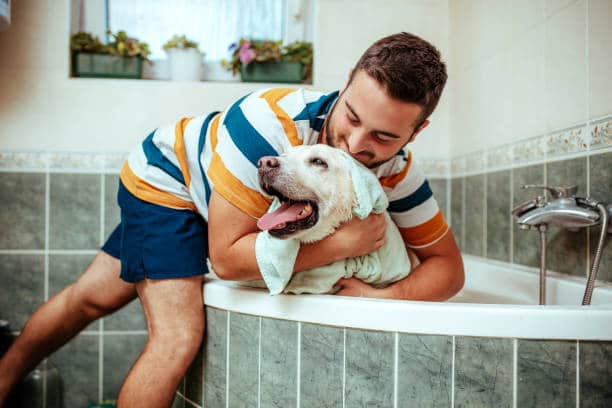Animal lovers often compare their pets to children, and just like children. A furry best friend may generate a lot of conflict in a relationship. Whether it’s a debate about how to teach a dog or how much care pets should receive. Pet conflict with your partner can be extremely stressful. According to one research, the average dog creates 2,000 fights over his or her lifespan. Today in this article we will guide you on how you should deal with the situation where the lab does not like your partner.
A quarrel about pets doesn’t have to signal the end of your partnership. But it may necessitate some compromises from both of you.
Remember that there may be some hatred from your partner’s side. Otherwise, labs are such lovely creatures that they do not hate anyone. So you will have to play your part in balancing the situation and creating a mutual love bond between lab and your partner.
Let’s start with a few tips and tricks that you can practice. So if your lab doesn’t like your partner, here is what you should try.
Practice Good Communication
If you’re thinking about starting a partnership, talk about your pet ideals with your partner. Having an indoor lab dog that sleeps in your bed is essential to you. Be sure your partner respects your priorities or you might wind up in a fight. If you’re currently in a relationship, now is the moment to start talking honestly and plainly. Get a pup only after discussing with your partner and receiving his or her passionate approval. If you really want to adjust the way you interact with your pets—for example, allowing your Labrador to sleep in your bed or going on more frequent walks with your pet and your partner—talk to your partner first before reaching a choice and assuming him or her to follow through.
Basically, when you start focusing on your partner too much and do not give due attention to the labrador. He starts hating your partner. At this stage, if your partner is also in love with your labrador, the situation will not become complicated.
Get Very Specific About The Problem
When it comes to pet disagreements, being clear about the issue might help you come up with a solution. You could believe that your pet is the problem or that your spouse despises your pet if your guy continually talks about your dog or your wife yells at your lab. However, a simple alteration like as educating your dog not to grovel or putting your lab off the bookcase may be enough to solve the problem. If you’re the pet owner, ask your spouse what the problem is and how to solve it. If you’re the one that despises your partner’s pet, be specific about what you require to feel a little better.
Seek The Advice Of A Professional
Everyone is frustrated by an inadequately trained dog or a violent lab. But the guy who brought the pet into the relationship is often more sensitive to—and protective about—the creature. If your spouse is irritated by a certain activity, such as scratching excessively, it’s time to seek professional help. A trainer can assist you in making your pet a more obedient part of the family, and a veterinarian may assist you in identifying underlying health issues that may be contributing to the annoyance. It will be costly, but it may be worthwhile to save your connection while also keeping your pet happy and healthy.
Before You Move In, Have A Discussion
Do not undervalue the difficulty of having step-pets. Before you move in, the ideal time to talk about prospective solutions to problems is before you live in. Make sure your spouse realizes that their pet will react differently to you than it does to them, and that even the most well-behaved animal will resist you in some manner.
However, when the behavior of the partner is not considerate or sympathetic towards your lab, the lab will also ultimately start hating him.
By discussing everything in detail with their partner you can establish a bond of love. It is all about considering the lab as your family member.
Acquire More Knowledge
Even if you’ve had pets before, take the time to educate yourself or get advice from professionals so you can come up with the best plan for easing your pet (and for you). Remember, just because you grew up with a dog doesn’t imply you’re a master in animal psychology or dog training.
When you understand the psychology of your lab, you better deal with it. In this way, you can play your part in preventing negative feelings like hatred. It is your understanding and wisdom that can prevent your lab from hating the partner.
Come Together On The Same Page
Before adopting any solutions, make sure you and your partner are on the same page.
Coming up with unilateral solutions for dealing with a partner’s pet without involving them is one of the greatest blunders you can do. Not only would this anger your spouse, but unless they join in and use a similar strategy, you may wind up confusing rather than punishing the animal.
Have a firm grasp on your obligations
Don’t get into bad habits that won’t help you in the long run. Talk about who will do what and when. Make careful plans for everything so you don’t have to deal with issues like, “You went to work and left the feces on the carpet?” It’ll be another eight hours before I get home.
Your inconsiderate cleanliness habits towards your pet can create feelings of hatred in your partner about your lab. Moreover, it will also result in your lab hating your partner. when both will consider each other there anyways they will never try to settle on anything. So make sure to potty train your lab and ensure maximum cleanliness whenever your partner is around it.
Find sympathy and care
Yes, you may be stuck with pet-zilla, but keep in mind that an animal that is hostile to you is feeling scared and uncomfortable. Compassion for the animal’s emotional pain will not only make life easier for the animal, but it will also reduce your aggravation and help you to make healthy decisions and judgments if and when the conflict arises again.
When a Dog Shows Up Out of the Blue
Dogs are sometimes passed down from sick or deceased family members. In that instance, a spouse may have valid grounds to refuse. For example, they may have had a long-standing fear of dogs since infancy, or you may already have a pet. As a result, your partner may remain indifferent even when the pet is in need. Such behaviour creates feelings of disliking in the lab Dr. Gavriele-Gold suggests finding for a new owner among your respected group of family, friends, and dog enthusiasts once it’s evident that adopting the puppy isn’t an option.
“Look among individuals you trust,” he advises, “as those who have lost a dog could be interested.” “People who have lost a spouse are frequently hesitant to re-socialize, but they are highly receptive to welcoming an animal.”
Your Dog’s First Meeting with a New Partner
Dog owners may confront the tough situation of starting a relationship with a new, dog-hating partner.
“That’s the most difficult of them all,” adds Dr. Gavriele-Gold. That’s one issue if it’s a question of acclimating a mate to live with a dog. If your dog doesn’t like you, he recommends “getting rid of the person.” “The dog is attempting to communicate with you.”
Of course, he appears to be joking. However, Dr. Gavriele-Gold, who owns two Bouviers and walks them throughout New York City, is a firm believer in their intuition. He has faith in their instinctive understanding of people. “I certainly wouldn’t offer up the dog,” he adds if your dog instinctively disdains a new person in your life.
Final Verdict
It’s fairly unusual for a person’s lab to despise his or her lover. This can be a boyfriend, girlfriend, husband, or wife, but one of the most prevalent questions is what to do if your dog just does not like your guy. Your dog may be defending you for a variety of reasons. Some dogs feel compelled to defend, while others may have been subjected to mistreatment in the past and have developed a distrust of men as a result. Finding out what is generating this behavior will assist you in resolving the problem.







